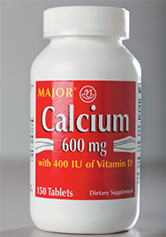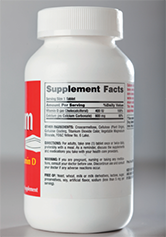9.2 Complementary and Alternative Medicine
For a variety of reasons, some patients will seek treatments outside the scope of conventional medicine. It’s important for pharmacy technicians to have a base understanding of how these alternate remedies work. Complementary medicine is a nonconventional treatment that is used together with conventional medicine. alternative medicine is a nonconventional treatment that is used in place of conventional medicine. And integrative health is the practice of coordinating conventional and complementary approaches in a holistic manner that can include mental, emotional, spiritual, social, and functional aspects of a patient’s life.

Meditation and guided breathing exercises are gaining credibility in the conventional medical community as complementary remedies.
Nonconventional treatments include natural products (homeopathic remedies, herbals, vitamins, minerals, and other dietary supplements), specialized diets, acupuncture, deep breathing and relaxation techniques, guided imagery, exercise movements such as yoga and Pilates, meditation, massage therapy, and chiropractic manipulations. The science behind the effectiveness of these treatments varies. But more and more primary care providers are incorporating both conventional and alternative treatments into their practices.
Dietary Supplements
A dietary supplement can be a vitamin, a mineral, or an herbal product that is considered useful for healthy nutrition, the prevention of an illness, or the alleviation or reduction of the symptoms of an illness. A large proportion of the population eat diets that are low in fresh vegetables and fruits and high in fast foods or processed snacks and mixes. Therefore, they do not receive the full range of vitamins and minerals needed for healthy nutrition. This is especially true for children, who particularly need vitamins and minerals for their growing bodies, so vitamins and supplements are often recommended. The typical uses, or indications, for some common dietary supplements are listed in Table 9.2.
 Practice Tip
Practice Tip
Most consumers do not realize that dietary supplements, including vitamins and minerals, are not regulated by the FDA in the same manner as are OTC drugs.
Table 9.2 Uses for Common Dietary Supplements
Dietary Supplement |
Use(s) |
|---|---|
calcium and vitamin D |
Improves bone strength |
echinacea |
Boosts the immune system |
garlic |
Antibacterial and antiviral action; maintains healthy cholesterol |
ginger |
Relieves nausea, motion sickness, and morning sickness |
ginkgo |
Improves memory; treats tinnitus and peripheral vascular disease |
glucosamine/chondroitin |
Lessens joint pain |
lactobacillus (a bacterium) |
Improves digestion, helps prevent diarrhea |
lutein |
Maintains eye health |
melatonin |
Relieves insomnia, especially in shift workers or time-zone |
omega-3 fatty acid (fish oil) |
Lowers triglyceride levels |
policosanol |
Maintains healthy cholesterol levels |
red yeast rice |
Maintains healthy cholesterol levels |
saw palmetto |
Treats benign prostatic hypertrophy (BPH) |
zinc |
Boosts the immune system; helps in the treatment of the common cold and wound healing |
Safety and Oversight
The Dietary Supplement Health and Education Act (DSHEA) states that supplements must be safe and accurately labeled. As with other food products, the label of a supplement indicates the recommended “serving size” rather than a dose. The label provides far less product information than an OTC drug label. In addition, the amount of active ingredient on the label may not match what is actually in the supplement because of inconsistencies in quality control or product contamination. Scientific studies on the effectiveness of most supplements are usually quite limited.
Steering consumers toward products with the seal of USP Verified on them is usually safe. (For more information on this seal, return to Chapter 3.) Manufacturers of these products have voluntarily submitted the products to USP’s stringent testing and auditing criteria for dietary supplements for quality, purity, and potency. This adds a layer of safety (and sometimes cost) to the product quality.
If a label contains a promise of a medical cure or effective treatment, the FDA can act to remove the drug from the market for false advertising since no proof of the label’s claims has been submitted to the FDA. The FDA can also remove any dietary supplement that is deemed dangerous, which has occurred in the past with several “diet pills.” The pharmacy technician should, of course, not counsel customers regarding the therapeutic uses of dietary supplements but refer patients to the pharmacist.


All vitamins and minerals are considered dietary supplements, so less information is legally required on their labels than for OTC drugs.
As many as 50% of consumers use one or more of these practices, often without their prescriber’s knowledge. Some consumers associate “natural” with “safe,” yet many of these products, especially herbal drugs and dietary supplements, have side effects or problematic interactions with prescription drugs even when used appropriately. It is good for technicians to urge customers to list these alternative medicine products and dietary supplements in their medication profile.
Technicians can also help customers understand that the safety and effectiveness of natural products are less assured than with OTC or prescription drugs because of the different federal oversight and level of required scientific studies. Patients should always consult with their physicians when choosing these various types of products for illnesses or conditions that last longer than seven days.
Vitamins and Minerals
There are many vitamin and mineral products on the market that range from multi-vitamins to doses of specific minerals and vitamins like the B complex, A, C, D, and E. Listed on the label of each is the proportion of active substance contained as compared to the daily value (DV). The daily value is the recommended level of intake of a certain vitamin or mineral.
 Practice Tip
Practice Tip
Most vitamins lose potency when exposed to heat and light. Advise customers to keep their vitamins on dimly lit, cool shelves.
The use of a daily multivitamin is not considered alternative medicine. Children or adults may need a daily multivitamin just to reach the minimum daily value standards. Pregnant women are encouraged to consume a daily prenatal vitamin with folic acid (prescription or OTC) to promote the health of their unborn child and prevent birth defects. A technician can be helpful in directing patients to both brand name and generic vitamins, including those in chewable, gummy, and liquid formulations for children and elderly consumers.
Some consumers take short-term high doses of individual vitamins for different indications, such as vitamin C to build one’s immunity and fight the common cold, vitamin E for heart health, and lutein for eye health. However, research has found that habitual megadoses of certain vitamins can be harmful to health. For instance, doses of vitamin E in excess of 800 IU per day may interfere with blood clotting or may increase the risk of heart disease. High supplement doses of vitamin A and other vitamins absorbed by fat can build up in the body and cause toxicity, liver damage, birth defects, and problems in the central nervous system.
 Pharm Fact
Pharm Fact
Vitamin E is not just one vitamin. It is actually a collection of eight fat-soluble vitamins with specific antioxidant properties.
Popular mineral supplements include iron and calcium. In many cases, these may be prescribed or recommended by the physician. Vegans and vegetarians, menstruating and pregnant females, and postsurgical patients may require extra iron to prevent anemia. Calcium combined with magnesium and vitamin D is recommended to keep bones strong and prevent osteoporosis (a weakening of the bones). Since the salt combinations of iron and calcium in different products contain variable amounts of “active minerals,” questions should be referred to the pharmacist for proper product selection. The National Center for Complementary and Integrative Health provides counsel on dietary supplements at its website: https://PharmPractice7e.ParadigmEducation.com/Supplements.
Herbal and Medicinal Plants
Though considered “natural,” herbals are also regulated as dietary supplements rather than as drugs by the FDA. The most popular herbals are echinacea, ginger, garlic, ginkgo, St. John’s wort, and soy. Their common uses were listed in Table 9.2. Herbals are also dosed in serving sizes.
 Pharm Fact
Pharm Fact
The International Unit (IU) is used to measure the amount of a substance. It is often used to quantify fat soluble vitamins (such as Vitamin A, D, and E.) The volume that makes up a single international unit depends on the substance being measured. For example:
1 mg of Vitamin E= approximately 1.21IU
Herbals have powerful components that are metabolized by the liver, just as other drug substances are. That is why they can cause drug interactions or affect the absorption, distribution, and elimination of prescription and OTC drugs and other supplements. Like OTC drugs, herbal medications do have side effects and can cause allergic reactions—not just the first time they are used but even after sustained use. Some herbal substances can accumulate in the body or cause an immune response to build up gradually.
St. John’s wort has a high potential for herb-drug interactions. St. John’s wort should not be used with a wide range of prescription drugs, such as antidepressants, birth control medications, antiseizure drugs, cyclosporine (an organ-rejection prevention drug), digoxin (a heart medication), warfarin (an anticoagulant), and other anticoagulants. Goldenseal is another herbal with potentially dangerous drug interactions. Concentrated and prolonged ingestion of ginger, garlic, and ginkgo should not occur with blood thinners and must be discontinued a week prior to surgery.
There are other elements to consider. Because herbals and medicinal plants are grown and harvested, pesticides and other contaminants can be introduced to the body in the herbal compound, causing reactions.
 Safety Alert
Safety Alert
Remind patients who are buying herbal supplements to carefully watch for any allergic reactions, such as rashes, itchiness, difficulty breathing, watery eyes, or difficulty swallowing. If these symptoms occur, they should discontinue use immediately.
Herbal Medicine Resources The NCCIH offers a list of the common herbs and their best uses on its website—along with allergic reactions and potential drug interactions. This list serves as an excellent source for pharmacy technicians and pharmacists: https://PharmPractice7e.ParadigmEducation.com/HerbsataGlance.
Another excellent resource is the American Botanical Council (ABC). The mission of this nonprofit organization is to help the public live healthier lives through the safe use of medicinal plants based on science and traditional wisdom. It publishes research that is peer reviewed. This information can be found at https://PharmPractice7e.ParadigmEducation.com/HerbAlgram.
Finally, the American Herbal Pharmacopoeia (AHP) is a nonprofit organization of botanists, chemists, herbalists, physicians, pharmacists, pharmacologists, university professors, researchers, and regulators dedicated to researching, collating, and distributing information on herbals. The information includes the chemical and botanical descriptions, growing and processing procedures, purity standards, dosages, side effects, contraindications, and drug interactions. This organization seeks quality controls and scientific standards. Working with the University of Vienna and the American Herbal Products Association, the AHP publishes a textbook of botanical microscopy. It has 800 pages describing 140 medicinal plants and common adulterated ingredients to provide resources for testing laboratories on the purity of powdered herbal substances. This volume is accompanied by another textbook on herbal macroscopy (or characteristics viewable by the naked eye) of 125 of the most popular botanical substances. The AHP website can be found at https://PharmPractice7e.ParadigmEducation.com/AHPHerbal.
As with other supplements, if patients are wondering what to purchase for their health, the pharmacist should counsel them on product selection, dosage, indication, and proper, safe use.
Protein Shakes and Nutritional Supplements
Patients who do not eat well and are losing weight (such as seniors or patients undergoing cancer treatments) or athletes who need to replenish or build up their systems after vigorous workouts may be candidates for protein shakes and nutritional supplements. Sources of protein can be animal based (such as casein, milk, and whey) or plant based (pea, rice, and soy). Some processed supplements are high in sugar, so caution must be exercised with patients with diabetes or prediabetes. Ensure is a brand of nutritional supplement that is available in various flavors. Like other brands, it supplies needed calories containing protein, minerals, and vitamins without fat, and it can be used as a meal supplement or replacement. Thick-It is a supplement requested by many older adult customers. When added to water, juices, tea, milk, or protein shakes, Thick-It assists in swallowing and digestion.
 Practice Tip
Practice Tip
Protein is needed by the body, but too much protein can stress the kidneys and cause some calcium loss. Some studies suggest that individuals should not consume more than 2 to 2.5 grams of protein per kg of body weight per day.
Probiotics
Probiotics work to build up the “good” or “friendly” microorganisms in one’s body, especially the positive-acting bacteria in the digestive system. Since antibiotics often destroy the bacteria causing the infection as well as the positive bacteria in the gastrointestinal (GI) tract (stomach and intestines), common side effects of antibiotic therapy include diarrhea and vaginal yeast infections. Physicians often advise patients taking antibiotics to eat yogurt that contains live bacteria cultures of Lactobacillus acidophilus or ingest a probiotic sold in the pharmacy. Patients who are lactose (milk sugar) intolerant often use probiotic supplements in order to combat digestive issues when they drink milk or eat cheese and other dairy products.
 Pharm Fact
Pharm Fact
Some pioneering scientific studies are finding that having the right bacteria in one’s digestive system to absorb the right nutrients may improve mood and energy.
Common probiotics contain various strains of Lactobacillus and Bifidobacterium, which can restore the balance of microorganisms in the GI tract. Some brand name probiotics include Culturelle, Align, and Lactinex (the latter is found in the refrigerator). Probiotics may also be used to treat the abdominal pain, cramping, and bloating of irritable bowel syndrome. Some scientific research is now finding that probiotics can help heal skin conditions, such as eczema, prevent allergies and colds, improve oral health, and assist with mood disorders.

Depending on the individual product, probiotics may be stored without refrigeration (as pictured) or in a special refrigerated section.